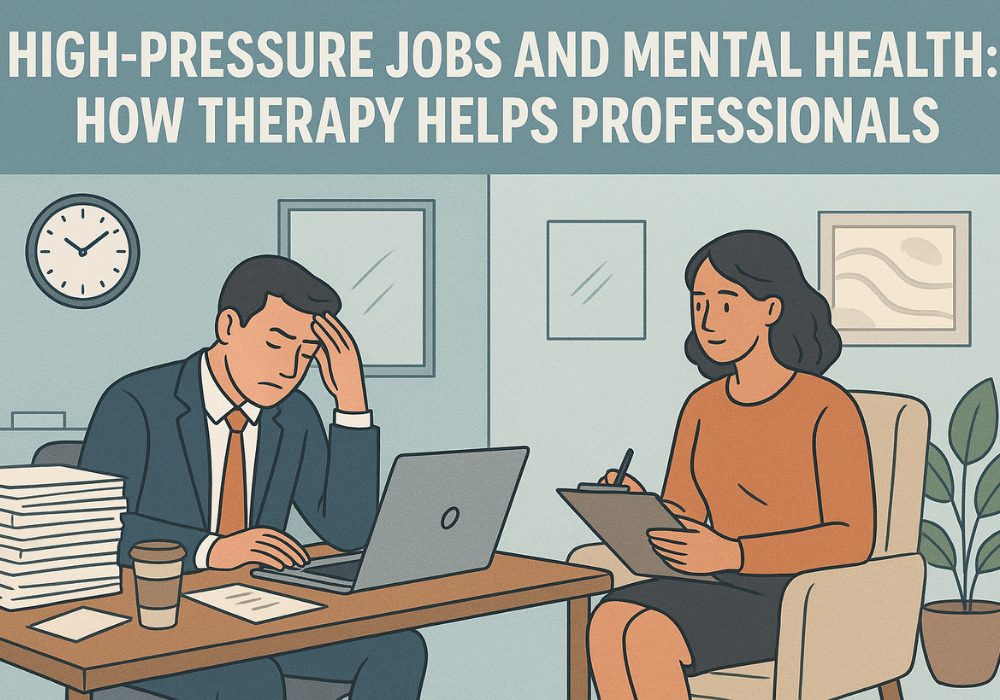Work doesn’t just pay the bills. For many, it defines identity, status, and purpose. But high-pressure jobs can also take a heavy toll on mental health. Deadlines, expectations, long hours—these pressures add up. That’s where therapy for professionals becomes not just helpful but sometimes necessary.
It’s not weakness to admit that the stress gets overwhelming. It’s human. In fact, more leaders, executives, doctors, and entrepreneurs are openly discussing how therapy has helped them stay grounded. Let’s take a closer look at why high-pressure jobs affect mental health so deeply and how therapy offers a lifeline.
The Weight of High-Pressure Jobs
Think about the industries we often associate with high stress:
- Corporate executives making million-dollar decisions.
- Doctors and nurses responsible for lives.
- Lawyers handling complex cases.
- Entrepreneurs betting everything on their startups.
These roles often come with prestige, but they also come with sleepless nights and invisible burdens. Stress isn’t just an occasional guest—it becomes a daily companion.
Psychologists often talk about “cognitive load.” When your brain is juggling too many decisions, it gets fatigued, just like a muscle. Add emotional pressure—fear of failure, constant comparison, or public scrutiny—and it’s easy to see why professionals struggle with burnout, anxiety, or depression.
As one CEO once shared in an interview, “Everyone sees the success. Few see the panic attacks in the bathroom between meetings.” That honesty reflects a growing awareness: behind polished resumes and corner offices, many professionals are fighting silent battles.
The Hidden Signs of Stress
Sometimes stress screams loudly—like when someone breaks down crying after work. Other times, it whispers:
- Trouble sleeping.
- Irritability with family.
- Difficulty focusing.
- A sense of emptiness, even after big achievements.
High-performing professionals often ignore these signs. They push through, telling themselves, “It’s just part of the job.” But untreated stress doesn’t fade. It compounds.
Mental health experts warn that chronic stress can lead to long-term issues like anxiety disorders, depression, or substance use. The body keeps score, too—stress raises blood pressure, weakens immunity, and even impacts heart health.
This is where therapy steps in as a proactive, not reactive, tool.
How Therapy Supports Professionals
The beauty of therapy is that it provides a confidential space. A professional can walk into a room—or log into a secure video call—and finally drop the mask. No boardroom politics. No fear of judgment. Just a trained therapist listening, guiding, and offering perspective.
Here are a few ways therapy helps:
1. Managing Stress and Anxiety
Therapists teach practical tools like breathing techniques, mindfulness, and cognitive reframing. For example, instead of thinking, “If I fail this project, my career is over,” a therapist helps reframe it into, “This project is important, but one challenge doesn’t define my worth.”
2. Work-Life Balance
Many professionals blur boundaries. They answer emails at midnight, skip vacations, and sacrifice family time. Therapy helps identify these patterns and create healthier boundaries without guilt.
3. Leadership Growth
Surprisingly, therapy isn’t just about fixing problems. It’s also about growth. Leaders often use therapy to improve communication skills, emotional intelligence, and decision-making. A calm, self-aware leader creates a healthier work culture.
4. Preventing Burnout
Burnout doesn’t happen overnight. It creeps in. Therapy equips professionals with early warning signs and strategies to prevent total collapse.
As one entrepreneur explained after starting therapy, “It wasn’t about removing stress. It was about learning how to carry it without breaking.”
Breaking the Stigma
For years, therapy carried a stigma. Many professionals thought it signaled weakness. But times are changing. High-profile figures like athletes, CEOs, and even politicians are openly discussing their mental health journeys.
Companies are also beginning to normalize therapy. Some now provide mental health benefits, on-site counseling, or partnerships with therapy platforms. A 2023 workplace wellness survey revealed that employees in high-stress roles were more likely to stay at companies that invested in mental health support.
In other words, seeking therapy isn’t just an individual choice anymore—it’s becoming part of professional culture.
Stories of Change
Sometimes the best way to understand therapy’s impact is through stories.
- The Corporate Lawyer: After years of 80-hour work weeks, she started experiencing panic attacks. Therapy helped her recognize that perfectionism was driving her stress. With her therapist’s support, she began delegating more and practicing self-compassion. Within months, the panic attacks decreased.
- The Tech Entrepreneur: He confessed that even after raising millions in funding, he felt empty. Therapy helped him uncover that his identity was too tied to his company’s success. By working on self-worth, he learned to celebrate small wins and find meaning outside work.
- The Doctor: Treating patients during a crisis, she felt overwhelmed by grief and exhaustion. Therapy gave her a place to process those emotions safely. It didn’t erase the hard realities, but it gave her strength to keep showing up for her patients without collapsing herself.
These stories remind us that therapy isn’t about weakness. It’s about resilience.
Therapy for Professionals: A Smart Investment
Here’s the truth: therapy for professionals is not a luxury. It’s a necessity in today’s demanding work culture. Just as companies invest in training, technology, or office design, investing in mental health pays dividends.
Professionals who engage in therapy often report:
- Better focus and productivity.
- Stronger relationships with colleagues and family.
- Greater emotional resilience.
- A renewed sense of purpose.
It’s not about removing stress completely—that’s impossible. It’s about learning to handle it in healthier ways.
Practical Steps to Get Started
If you’re a professional considering therapy, here’s how to begin:
- Identify Your Needs – Are you struggling with anxiety, burnout, or work-life balance? Clarity helps find the right therapist.
- Explore Options – From in-person sessions to online platforms, therapy is more accessible than ever.
- Start Small – Even one session can provide insight. Don’t wait for a “breaking point.”
- Commit to the Process – Therapy works best when it’s consistent. Think of it like going to the gym for your mind.
- Choose Fit Over Prestige – The right therapist is one you connect with, not necessarily the one with the fanciest title.
The Bigger Picture
Imagine a world where therapy is as routine as annual physical check-ups. Where CEOs, doctors, and lawyers openly talk about attending therapy the way they talk about attending board meetings. That world is possible—and it starts with each professional taking one brave step.
As one therapist often tells her clients, “You don’t have to carry it all alone. That’s why we’re here.”
High-pressure jobs will never disappear. But the way we handle them can evolve. With therapy, professionals don’t just survive stress. They learn to thrive in spite of it.
Final Thoughts
Stress is part of modern professional life, but suffering in silence doesn’t have to be. Therapy offers tools, insight, and support that can make the difference between burnout and balance.
Remember, therapy for professionals isn’t about weakness—it’s about strength. It’s about showing up for yourself so you can continue showing up for your career, your family, and your dreams.
The truth is simple: success should not cost your sanity. And with therapy, it doesn’t have to.
FAQs
Why are high-pressure jobs so damaging to mental health?
High-pressure jobs often come with long hours, constant decision-making, and the weight of responsibility. Over time, this stress can lead to burnout, anxiety, or depression. The pressure doesn’t just affect work—it seeps into personal life, sleep, and even physical health.
How can therapy for professionals help with stress?
Therapy provides a confidential space to unpack stress. Professionals learn coping tools like mindfulness, time management, and reframing negative thoughts. Instead of letting pressure spiral into burnout, therapy helps build resilience and balance.
Is therapy only for people who are struggling?
Not at all. Many professionals use therapy as a growth tool, not just a crisis solution. It helps with leadership skills, emotional intelligence, and decision-making. Think of it like preventive care for your mind.
Will therapy really make me more productive at work?
Yes, in many cases. When stress is managed and emotions are balanced, professionals often report clearer focus, better communication, and improved problem-solving. In fact, therapy can enhance both personal and professional performance.
What types of professionals benefit most from therapy?
Executives, doctors, lawyers, teachers, entrepreneurs—anyone in a high-pressure role can benefit. The truth is, no matter the industry, mental health challenges don’t discriminate. Therapy adapts to the unique stressors of each profession.
How do I know if I need therapy?
Some signs include constant fatigue, irritability, trouble sleeping, difficulty focusing, or feeling unmotivated even after achievements. If you find yourself snapping at loved ones or dreading work daily, therapy may be a wise step.
Is online therapy effective for professionals with busy schedules?
Yes, absolutely. Many professionals prefer online therapy because it fits into packed schedules. It’s flexible, confidential, and accessible from anywhere—making it easier to stay consistent.
Isn’t therapy still seen as a weakness in professional settings?
That stigma is fading quickly. More leaders and companies openly support therapy, and many workplaces now offer mental health benefits. Seeking therapy today is often viewed as a sign of strength, self-awareness, and leadership.





